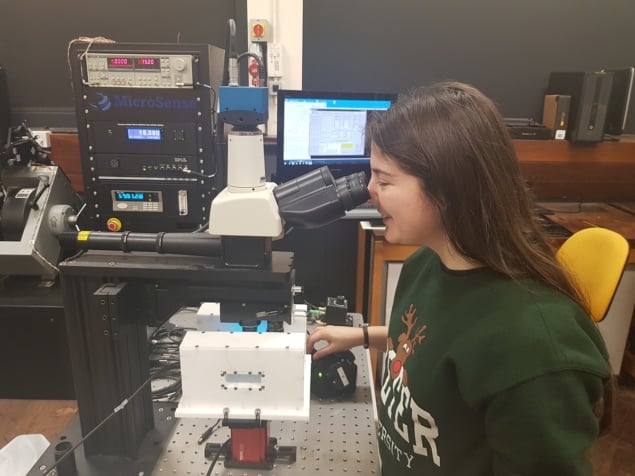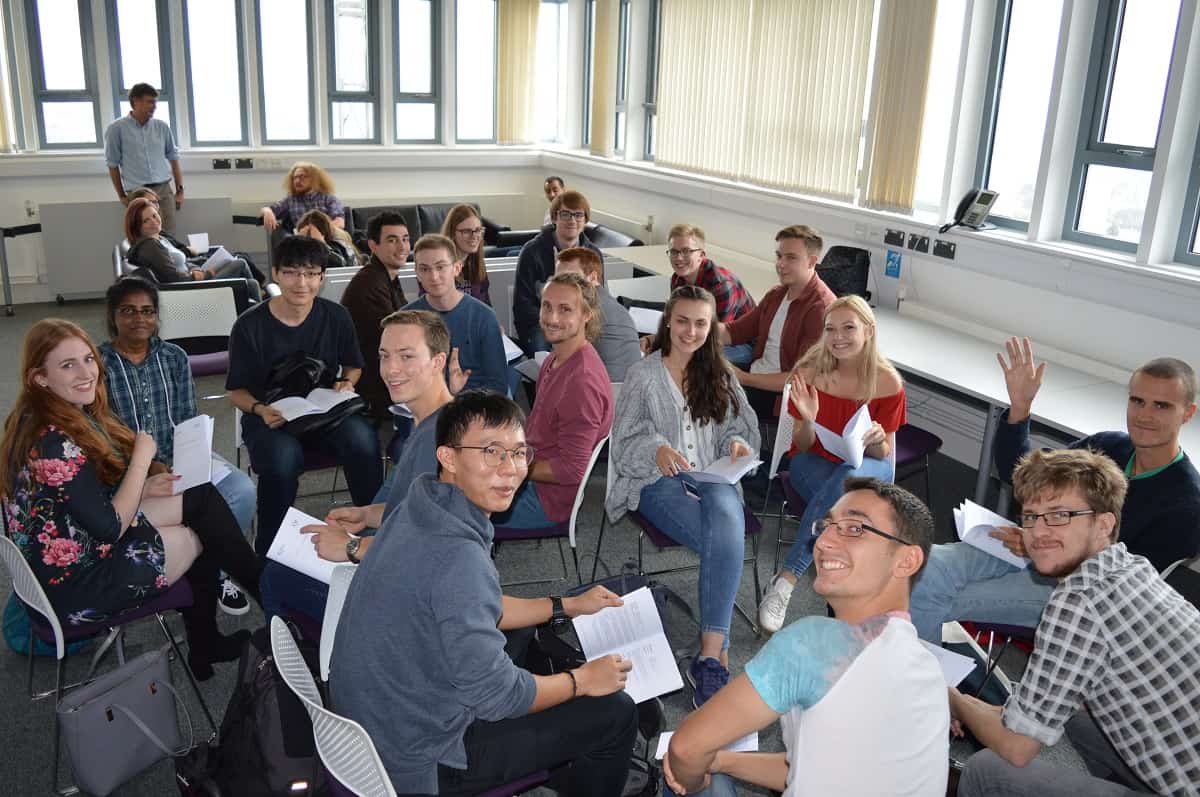Postgraduate researchers are encouraged to embrace responsibility and push the boundaries at Exeter’s Centre for Doctoral Training in Metamaterials. If that sounds like you, the latest round of PhD studentships is now open for applications from cross-disciplinary researchers in physics and engineering

The University of Exeter’s Centre for Doctoral Training in Metamaterials (or XM2 as it is more succinctly known) is as much about the people as it is about the science. Funded by the Engineering and Physical Sciences Research Council (EPSRC), the University of Exeter and industry partners, the £12m centre now comprises more than 80 PhD students from across the UK, the European Union and further afield.
For context, metamaterials have seen a surge in research interest over the past two decades, with scientific publications per year rising from 66 in 2000 to just short of 17,000 in 2019. It’s easy to see why. Metamaterials are artificial, structured materials with unique electromagnetic, acoustic, thermal and/or mechanical properties engineered through design and fabrication (and typically consisting of periodic arrays of subwavelength resonators). As such, scientists are able to access material and device functionalities beyond those found in nature, opening up diverse applications in markets such as next-generation energy technologies, defence and security, aerospace, healthcare and advanced communications, among others.
Meta together
Postgraduate researchers (PGRs) are drawn to XM2 for a variety of reasons, though chief among them is the prospect of a very different postgraduate experience to the traditional “lone scholar” PhD pathway. For starters, XM2 is all about harnessing the knowledge and experience of the collective – a cohort-based learning model that embeds PhD students within a local support network made up of their peers, academic supervisors and postdoctoral scientists. Equally important is the structured training programme at XM2, built around continuing science education, professional skills development, as well as extensive industry and public engagement.
“Our young researchers demonstrate fantastic spirit and engagement, resilience and the drive to make a difference,” claims Alastair Hibbins, director of Exeter’s Centre for Metamaterial Research and Innovation (CMRI), which fosters XM2. “We have built a training programme that provides our graduates with the skills and understanding to become tomorrow’s leaders in industry, as well as in our academic institutions.”
That’s a view echoed by XM2 programme manager Anja Roeding, whose goal is “a more holistic PhD programme for early-career scientists”, one that encourages innovation across subjects and where all students can make the most of their individual strengths. “It is fair to say that the first year, in particular, is quite a challenge for our PGRs,” she explains. “This is when they have to learn how to juggle the diverse training elements, assessments and their research activities – though they have plenty of support from their peers and the staff who accompany this journey of professional development and personal growth.”
Connected community
A case in point is Elizabeth Martin, a fourth-year XM2 student whose research focuses on microfluidic metamaterials for lab-on-chip technology. Specifically, Martin is investigating the collective behaviour of ferromagnetic elements in so-called magnetoelastic membranes – continuous periodic structures with applications in next-generation medical diagnostic devices.
After completing an undergraduate degree in maths and physics at Exeter, Martin was initially attracted to the university’s PhD programme by the opportunity to specialize in metamaterials R&D. What really sold her on XM2, however, is the extensive training programme that sits alongside and supports students’ core PhD research activities.

The front-loaded training programme kicks in from day one, with new students challenged to produce a high-quality piece of research during their first six months in XM2. “It’s a bit daunting, but the benefits are clear,” explains Martin. “The tight deadline means you start doing really useful research in those first few weeks while you’re still finding your feet.”
In many ways, this six-month project looks like a PhD in miniature, with students required to produce a report on their findings in the form of an academic paper. There’s also a viva with senior XM2 researchers, plus a formal presentation that the students give to their year-group peers. “Ultimately, the process is all about collective support, guidance and learning by doing – plus getting into good research habits early on,” says Martin.
Another unique aspect of XM2 is the emphasis on wider professional skills training and development. Throughout their four-year PhD project, students will undertake a range of soft-skills courses spanning topics such as project management; public speaking; teaching in higher education; creativity and innovation; and intellectual property and business awareness.
There’s additional support from the University of Exeter’s specialist cognitive behavioural coaching (CBC) unit. Staff from the CBC team run one-to-one or small group sessions with XM2 students to foster continuous improvement on operational issues such as work/life balance, upwards management, perfectionism, and work planning and scheduling.
“The soft-skills training has been really useful, focusing on areas where PhD students typically lack confidence or experience,” says Martin. “It’s a very different perspective. We’ve even had presentation and interview training courses delivered by professionals with backgrounds in theatre and TV. There’s also been support on lecturing and voice therapy, covering stuff like body language and how to present yourself effectively in a minute.”
Network effects
Fellow researcher Joe Shields is currently in the second year of a PhD in which he is developing tunable metasurfaces for a range of photonics applications – for example, flat lenses and next-generation displays. Like Martin, he chose XM2 because of the extensive training programme and the community-centric research programme. “I wanted to be part of a bigger, diverse group of people working across many different specialisms, with the opportunity to make connections and learn more widely,” he explains.
Alongside their core research, XM2 students undertake a busy schedule of science training during the first two years of their PhD programme. Topics include metamaterials physics, materials engineering, device production, characterization and programming skills. Shields, for his part, has also completed courses on machine learning and computational techniques for engineers.

“I was a teacher for a couple of years after completing my MSc in physics at Oxford, so I’d already done a lot of the soft-skills training by the time I joined XM2,” says Shields. “However, the emphasis on outreach at XM2 has given me the opportunity to present my research to the general public and people of different ages and backgrounds. That experience has been invaluable.”
Shields is also a big fan of the “hit the ground running” induction period for all new XM2 arrivals. “The initial six-month research project definitely worked well for me. It was a packed schedule and covered almost all the fabrication techniques I need for my PhD. It’s great to jump straight into it – making devices and testing them with the support of the wider group.”
That peer-to-peer learning and support is hard-wired into the day-to-day activity of XM2, notes Shields. “We have a large office – around 30 PhD students comprising new-entrants and second-year students like myself. A lot of our dialogue centres on collaboration, whether that’s help with a fabrication technique, a specialist piece of software or a more direct research interaction.”
It’s good to talk
Another central feature of XM2 is the monthly cross-cohort group meetings, a platform for PhD students from different year groups to share insights about their research and professional development activities – e.g. industry and research visits, conferences and external training. During her third year, Martin acted as chair for one of these groups, planning and organizing meetings for students with a range of research interests, domain knowledge and experience.
“The cross-cohort groups are by the students for the students – we have total freedom to self-organize and prioritize our respective agendas,” explains Martin. That could mean getting university staff along to do some CV training or running a workshop on interview best practice. There’s also plenty of informal peer-to-peer instruction in areas of common interest like data analysis and programming skills. “The group can be a great starting point for deeper learning and an excellent way of working out who knows what within the XM2 programme,” Martin adds.
In fact, taking responsibility early is a recurring theme among XM2 students. Martin herself spent last summer supervising an undergraduate student research project – an experience that will come in useful should Martin ultimately decide to pursue an academic research career.
“I submitted the original research proposal, secured funding from the XM2 project budget, and even supervised the application and interview process,” explains Martin. “I would never have had this opportunity if I wasn’t part of XM2.”
All told, it seems there’s plenty of scope for PGRs to push the boundaries within the XM2 programme. “You’re not spoon-fed here,” concludes Martin. “It’s down to you to decide which opportunities you want to pursue.”
- Applications are now open for the XM2 2020 PhD programme. Deadline: 31 March 2020.




